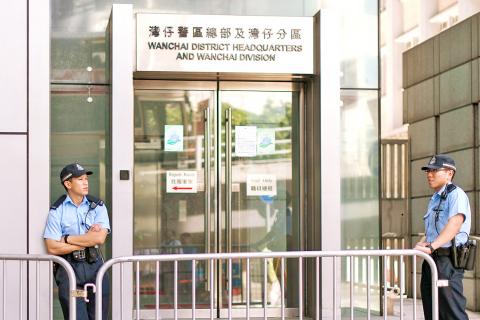Five organizers of a massive pro-democracy rally in Hong Kong were charged by police yesterday with a range of minor offences, as pressure builds on Chinese Communist Party rulers in Beijing to introduce political reforms in the former British colony.
The pro-democracy march on Tuesday, which organizers said attracted more than half a million people, and a subsequent sit-in by mainly student groups rank among the biggest challenges yet to China since the July 1, 1997, handover.
Police said the charges brought against the organizers included failure to comply with instructions from a police officer, obstructing officers performing their duties, leaving a running vehicle and providing false information to an officer. Police did not name those charged.

Photo: AFP
“This is political persecution,” Civil Human Rights Front vice convenor Icarus Wong (王浩賢) said. “Five-hundred ten-thousand people marched ... the government’s response is to arrest the organizers.”
Wong said police arrested Civil Human Rights Front convenor Johnson Yeung (楊政賢), the group’s treasurer, a driver, and two volunteer workers.
Wong said one charge — that of providing false information — brought against one of the organizers was for giving police the incorrect number for a street address, though the correct street name was provided.
The July 1 march is an annual event that marks Hong Kong’s return to China as a special administrative region under a “one country, two systems” policy that gives it wide-ranging autonomy and a separate legal system.
This year, however, the march followed an unofficial referendum on democracy in which nearly 800,000 voted, and led to an overnight sit-in in Hong Kong’s Central business district. Police arrested more than 500 people early on Wednesday after they sat down and refused to leave.
Tensions escalated again on Thursday when lawmakers pelted Hong Kong Chief Executive Leung Chun-ying (梁振英) with objects during a Legislative Council meeting, and shouted for democratic reforms.
Meanwhile, China’s top newspaper yesterday dismissed fears that the territory’s autonomy was being eroded, saying Beijing’s policy had not and would not change.
In a front page commentary, the People’s Daily said the white paper Beijing published last month was proof that China was committed to Hong Kong’s high degree of autonomy.
“Some people think that the white paper deviated from the basic policy the center [of the party] first proposed, and others worry about whether the center will squeeze Hong Kong’s high degree of autonomy,” it wrote. “This is all totally baseless.”
Critics of the white paper say its assertion of China’s “comprehensive jurisdiction” over Hong Kong, as well as its requirement that the territory’s “administrators,” including judges, be patriotic, are violations of the Basic Law and the agreement that China signed with Britain which paved the way for the handover.
The newspaper admitted that in the 1980s, when Beijing came up with its proposals for Hong Kong, some people in the territory feared China’s changing its position.
But since former Chinese leader Deng Xiaoping (鄧小平) promised the high degree of autonomy and it was written into Hong Kong’s Basic Law, country’s leaders have never veered from this course, it said.
“Experience proves the center keeps its promises, and the center’s basic policy toward Hong Kong is completely correct,” it said.

CHAOS: Iranians took to the streets playing celebratory music after reports of Khamenei’s death on Saturday, while mourners also gathered in Tehran yesterday Iranian Supreme Leader Ayatollah Ali Khamenei was killed in a major attack on Iran launched by Israel and the US, throwing the future of the Islamic republic into doubt and raising the risk of regional instability. Iranian state television and the state-run IRNA news agency announced the 86-year-old’s death early yesterday. US President Donald Trump said it gave Iranians their “greatest chance” to “take back” their country. The announcements came after a joint US and Israeli aerial bombardment that targeted Iranian military and governmental sites. Trump said the “heavy and pinpoint bombing” would continue through the week or as long

TRUST: The KMT said it respected the US’ timing and considerations, and hoped it would continue to honor its commitments to helping Taiwan bolster its defenses and deterrence US President Donald Trump is delaying a multibillion-dollar arms sale to Taiwan to ensure his visit to Beijing is successful, a New York Times report said. The weapons sales package has stalled in the US Department of State, the report said, citing US officials it did not identify. The White House has told agencies not to push forward ahead of Trump’s meeting with Chinese President Xi Jinping (習近平), it said. The two last month held a phone call to discuss trade and geopolitical flashpoints ahead of the summit. Xi raised the Taiwan issue and urged the US to handle arms sales to

State-run CPC Corp, Taiwan (CPC, 台灣中油) yesterday said that it had confirmed on Saturday night with its liquefied natural gas (LNG) and crude oil suppliers that shipments are proceeding as scheduled and that domestic supplies remain unaffected. The CPC yesterday announced the gasoline and diesel prices will rise by NT$0.2 and NT$0.4 per liter, respectively, starting Monday, citing Middle East tensions and blizzards in the eastern United States. CPC also iterated it has been reducing the proportion of crude oil imports from the Middle East and diversifying its supply sources in the past few years in response to geopolitical risks, expanding

Pro-democracy media tycoon Jimmy Lai’s (黎智英) fraud conviction and prison sentence were yesterday overturned by a Hong Kong court, in a surprise legal decision that comes soon after Lai was jailed for 20 years on a separate national security charge. Judges Jeremy Poon (潘兆初), Anthea Pang (彭寶琴) and Derek Pang (彭偉昌) said in the judgement that they allowed the appeal from Lai, and another defendant in the case, to proceed, as a lower court judge had “erred.” “The Court of Appeal gave them leave to appeal against their conviction, allowed their appeals, quashed the convictions and set aside the sentences,” the judges